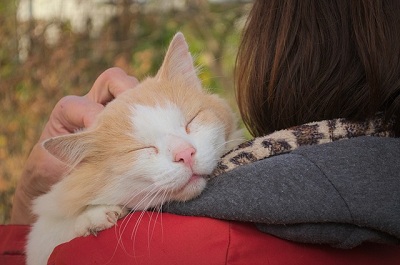How Do Cats Help with Depression?
How Do Cats Help with Depression?
Cats are known for their miraculous healing properties. Scientific studies reveal that cats purr at the frequency similar to one of meditative state. Because of that, cat purring has the ability to calm down a cat and her owner. Moreover, studies have shown that purr frequency helps a cat heal her bones. For that reason, cats less suffer from broken bones than dogs. It does not surprise us that medical experts believe that it is the number one reason cats affect humans and their mood in the best possible way. They help people who suffer from anxiety and PSTD to calm down. There are numerous studies that confirm this. Furthermore, patients with depression report better mood and better motivation. Experts believe that people with depression need a proper schedule and the reason to wake up in the morning. Taking care of their precious pet gives them both. To learn more about the question – how do cats help with depression – the article “How Your Cat Can Benefit Your Mental Health” gives us the following explanation.
How Do Cats Help with Depression?
Some of the reasons why cats are great for our mental health are obvious; cats provide comfort and friendship, and a confidential, non-judgemental listening ear. Far from the ‘self-interested and aloof’ stereotype that’s perpetuated by dog people, cats can often seem to have a sixth sense for when you’re most in need of their company and affection, and they provide it in spades.
Dr Eva Chylarova, an ex-vet and head of research at the Mental Health Foundation responded to the charity’s joint study with Cats Protection, saying: “Looking after a pet can bring structure to your day, reduce feelings of isolation and loneliness, and act as a link to other people.”
Another study at Miami University in Ohio found that ‘pet owners had greater self esteem, were more physically fi t, tended to be less lonely, were more conscientious, were more extraverted, tended to be less fearful, and tended to be less preoccupied than non-owners.’
And, as cat lovers know, pets of the feline variety are particularly good for boosting our mental well-being. One study, conducted in Switzerland in 2003, even suggested that having a cat is the emotional equivalent of having a romantic partner – but I haven’t told my husband that! In fact, much like my husband, Tybalt and Scala are an amazing source of comfort and companionship on my lowest days – whether they’re sitting with me in bed, perched on the edge of my desk watching me work, making me laugh with their play fighting and silly antics, or just pestering me to attend to their whims.
Depression can often feel like living beneath a dark cloud of self-loathing and despair that just won’t shift no matter what you try, but Scala and Tybalt’s unconditional love and acceptance has been a powerful force in breaking through that cloud and learning to love and accept myself.
One of the ways in which cats help with depression is their ability to attach and make a strong bond with their owner. Even though scientists are not sure if that is the case, a majority of owners believe that they share a strong bond with their cats. Cats, as pets in general, are able to give and share unconditional love. People with depression need exactly that. They do not need to be judged and criticized. They need exactly the opposite. Cat’s love and affection are exactly what help people to deal with depression.










